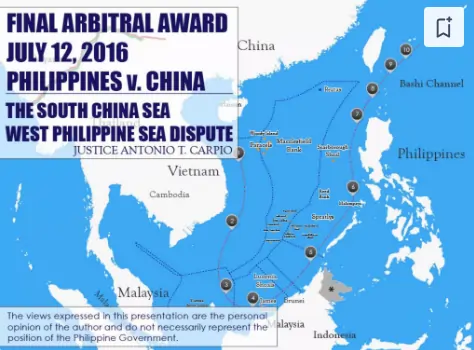
2016 Arbitral Ruling: China’s ‘Political Circus’ Claim
-ADVERTISEMENT-
Introduction
In 2016, the Permanent Court of Arbitration in The Hague made a landmark ruling in favor of the Philippines regarding the South China Sea dispute. China dismissed this ruling, calling it a “political circus.”
This article delves into the implications of the ruling, China’s stance, and the broader geopolitical context. By analyzing these factors, we aim to provide a comprehensive understanding of one of the most significant international legal decisions of the 21st century.
The Background of the Dispute
The South China Sea: A Region of Strategic Importance
The South China Sea is a critical maritime region, not only for the countries surrounding it but also for global trade. With over $3 trillion worth of trade passing through its waters annually, control over this region is highly coveted.
Additionally, the South China Sea is rich in natural resources, including oil and natural gas, which further escalates the stakes involved.
Historical Claims and Modern Conflicts
China’s claim over the South China Sea is based on the so-called “Nine-Dash Line,” a demarcation line used by the Chinese government to outline its claimed territories.
This claim overlaps with those of several Southeast Asian nations, including the Philippines, Vietnam, Malaysia, and Brunei. The dispute has its roots in historical claims, colonial legacies, and the strategic importance of the region.
The 2016 Arbitral Ruling
Philippines’ Legal Challenge
In 2013, the Philippines initiated arbitration proceedings against China under the United Nations Convention on the Law of the Sea (UNCLOS). The Philippines sought to invalidate China’s extensive claims in the South China Sea and protect its sovereign rights over its Exclusive Economic Zone (EEZ).
The Tribunal’s Findings
The tribunal’s ruling in 2016 was unequivocally in favor of the Philippines. Key findings included:
- China’s “Nine-Dash Line” has no legal basis under international law.
- China had violated the Philippines’ sovereign rights in its EEZ by interfering with fishing and petroleum exploration.
- China’s construction of artificial islands and the destruction of coral reefs caused severe environmental damage.
-ADVERTISEMENT-
China’s Reaction: Dismissal and Defiance
China refused to participate in the arbitration proceedings and subsequently rejected the tribunal’s ruling, labeling it a “political farce.” Beijing’s response was marked by a continuation of its activities in the South China Sea, including military fortifications and further island-building efforts.
The Geopolitical Implications
Regional Tensions and Alliances
The ruling intensified regional tensions, with various Southeast Asian nations bolstering their military capabilities and seeking stronger alliances. The United States, Japan, and Australia, among others, have voiced support for the tribunal’s decision, calling for freedom of navigation and respect for international law.
China’s Strategic Calculations
China’s dismissal of the ruling is rooted in its broader strategic calculations. The South China Sea is crucial for China’s economic and military strategies. By controlling this region, China ensures secure trade routes and enhances its strategic depth. T
his defiance also signals China’s willingness to challenge the existing international order.
Environmental and Economic Impact
Destruction of Marine Ecosystems
China’s activities in the South China Sea, particularly the construction of artificial islands, have caused irreversible damage to coral reefs and marine ecosystems.
The tribunal’s findings highlighted the environmental degradation caused by these activities, emphasizing the need for sustainable practices and adherence to international environmental standards.
Economic Ramifications
The ongoing dispute and China’s rejection of the ruling have significant economic implications. Regional instability affects trade routes and investment flows, with businesses wary of the risks associated with geopolitical conflicts.
Moreover, the potential for resource exploitation remains a contentious issue, with countries eager to tap into the rich reserves of oil and natural gas.
Arbitral Ruling: International Legal Precedents
Strengthening International Maritime Law
The 2016 Arbitral Ruling sets a critical precedent in international maritime law. It reinforces the principles enshrined in UNCLOS, particularly regarding the rights of coastal states over their EEZs and continental shelves.
The decision underscores the importance of legal mechanisms in resolving international disputes.
-ADVERTISEMENT-
Challenges to Enforcement
Despite the significance of the Arbitral Ruling, enforcement remains a challenge. The absence of a global enforcement mechanism for international court decisions means that powerful states can, and sometimes do, ignore unfavorable rulings.
This lack of enforceability undermines the authority of international law and creates a precedent where compliance is based on the willingness of the parties involved rather than a mandatory obligation.
Additionally, geopolitical interests often influence the responses of other countries and international bodies to such arbitral ruling. In the case of the South China Sea dispute, China’s economic and political influence can deter other nations from pressing for enforcement.
Moreover, international bodies like the United Nations have limited power to enforce rulings without the backing of member states.
These challenges highlight the limitations of international law in resolving disputes involving powerful states and emphasize the need for stronger mechanisms to ensure compliance and uphold the rule of law globally.
Conclusion
The 2016 arbitral ruling on the South China Sea dispute represents a watershed moment in international maritime law and geopolitical dynamics. China’s dismissal of the ruling as a “political circus” underscores the complexities of enforcing international legal decisions.
As regional and global powers navigate the implications of this Arbitral Ruling, the South China Sea remains a flashpoint for potential conflict and a test case for the efficacy of international law.
Frequently Asked Questions
What was the 2016 arbitral ruling about?
Why does China call it a ‘political circus’?
How has the international community reacted?
What are the potential impacts of this statement?
Has this affected China’s relations with the Philippines?
Related Queries
You May Also Read
- Bini Cherry on Top MV Hits 2 Million Views in Record Time
- Cinemalaya’s 20th Anniversary: Filipino Filmmakers Roar
- Exclusive: What Led to Kawhi Leonard’s Removal from Team USA
- Cathay Pacific: A 76-Year-Old Injured by Falling Luggage
- Palarong Pambansa 2024 in Cebu City: Celebrating Sports
- TikTokio.com: Caution Advised for Third-Party Risks
- May 2024 CPALE Results Released in Three Days 📊🎉
- Discover the Excitement at 555 BMW Casino | Play Now
- Net Trends: Stay Updated With The Latest in The Philippines
- Breaking News
- Business
- Casino
- Sports
- Entertainment
- News
We Also Recommend
- Mega Swerte Register | Get a Free 888 Welcome Bonus
- Mega Swerte Casino: Top 10 Games You Must Try Today
- Mega Swerte Casino Login Get Free Exclusive Bonus – Play Now
- Mega Swerte – Free 888 Bonus When You Register Today!
- Mega Swerte Gaming: Get an Instant 888 Bonus Today! Play Now
- Mega Swerte Review: Claim Your Bonus Up to 888 Now

Rihanna Cruz, is a wordsmith seasoned in three years of online gaming journalism, captivates readers with her passion-fueled articles. She translates complex mechanics into engaging narratives, offering insightful perspectives on mobile RPGs, esports psychology, and more.










